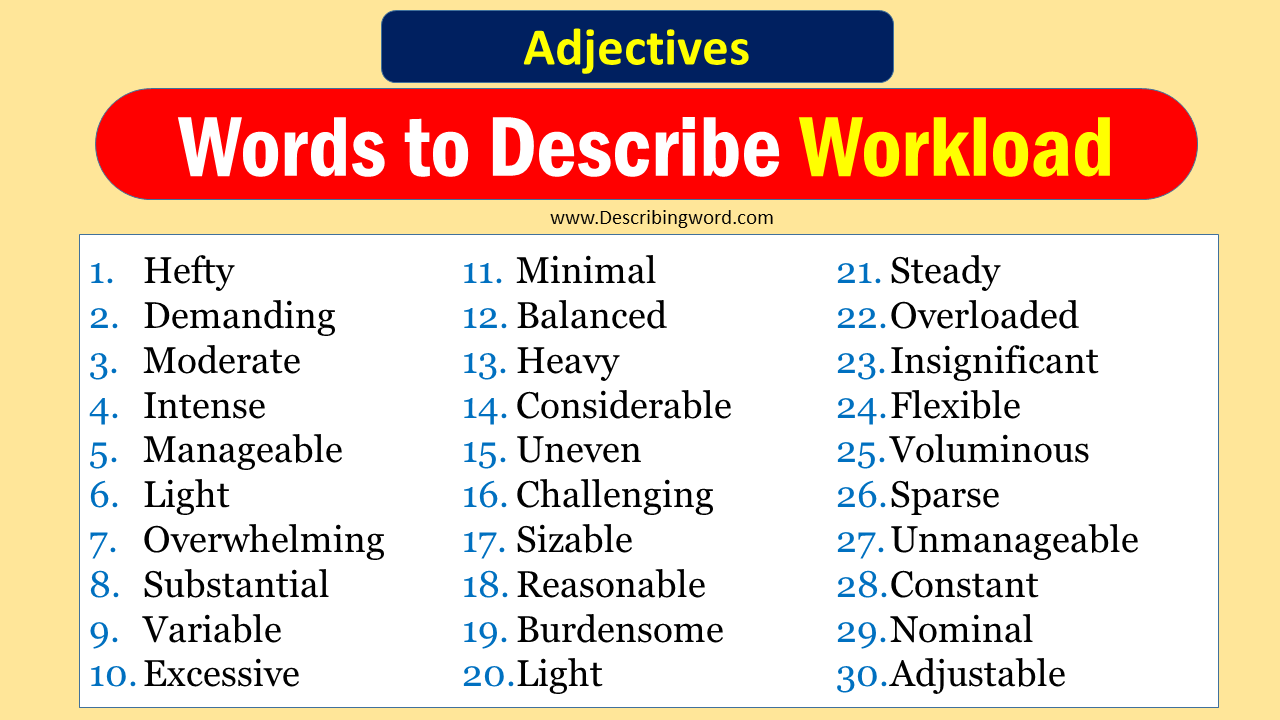Workload refers to the amount of work assigned to or expected from a person within a specified time frame. It encompasses the tasks, duties, and responsibilities that need to be completed.
In this lesson, you’ll discover a variety of words that can be used to describe or refer to ‘workload‘. These adjectives will help you articulate the nature and extent of work more effectively.
Words to Describe Workload
Here are the most common words to describe Workload:
| Hefty | Demanding | Moderate |
| Intense | Manageable | Light |
| Overwhelming | Substantial | Variable |
| Excessive | Minimal | Balanced |
| Heavy | Considerable | Uneven |
| Challenging | Sizable | Reasonable |
| Burdensome | Light | Steady |
| Overloaded | Insignificant | Flexible |
| Voluminous | Sparse | Unmanageable |
| Constant | Nominal | Adjustable |
Adjectives for Workload
1. Heavy
Meaning: Excessively burdensome
Example: The heavy workload is exhausting for everyone.
2. Manageable
Meaning: Possible to handle
Example: The manageable workload keeps employees from burning out.
3. Overwhelming
Meaning: Too much to handle
Example: The overwhelming workload caused stress among staff.
4. Reasonable
Meaning: Within practical limits
Example: The reasonable workload ensures balanced productivity.
5. Challenging
Meaning: Difficult but rewarding
Example: The challenging workload motivates employees to grow.
6. Light
Meaning: Not burdensome
Example: The light workload allows for quick completion.
7. Excessive
Meaning: More than needed
Example: The excessive workload causes frustration and fatigue.
8. Manageable
Meaning: Able to be managed
Example: The manageable workload helps maintain productivity.
9. Balanced
Meaning: Properly distributed
Example: The balanced workload ensures steady progress.
10. Intense
Meaning: Extremely demanding
Example: The intense workload requires constant focus.
11. Reasonable
Meaning: Logical and fair
Example: The reasonable workload is fair for everyone.
12. Moderate
Meaning: Neither too much nor too little
Example: The moderate workload is just right.
13. Tiring
Meaning: Causing fatigue
Example: The tiring workload leaves employees exhausted.
14. Adjustable
Meaning: Can be modified
Example: The adjustable workload allows for flexibility.
15. Manageable
Meaning: Can be handled
Example: The manageable workload keeps stress levels low.
16. Daunting
Meaning: Intimidating and tough
Example: The daunting workload requires significant effort.
17. Bearable
Meaning: Able to be endured
Example: The bearable workload prevents employee burnout.
18. Achievable
Meaning: Possible to accomplish
Example: The achievable workload promotes employee morale.
19. Considerable
Meaning: Significant in amount
Example: The considerable workload requires a strategic approach.
20. Flexible
Meaning: Allows adaptation
Example: The flexible workload supports varying schedules.

Positive Adjectives for Workload
- Manageable
- Light
- Balanced
- Flexible
- Moderate
- Reasonable
- Steady
- Sustainable
- Adjustable
- Satisfying
Negative Adjectives for Workload
- Overwhelming
- Excessive
- Heavy
- Burdensome
- Unmanageable
- Demanding
- Intense
- Unrelenting
- Inflexible
- Unreasonable
Other Words for Workload
Here are other words for Workload:
- Task load
- Work volume
- Job demand
- Duty roster
- Assignment list
- Work agenda
- Task list
- Job load
- Responsibility chart
- Duty schedule
- Work burden
- Task schedule
- Work pile
- Work queue
- Assignment queue
- Responsibility load
- Work roster
- Duty load
- Task burden
- Work docket
- Assignment burden
- Task queue
- Job roster
- Work schedule
- Task roster
- Responsibility queue
- Job schedule
- Assignment schedule
- Workload balance
- Task loadout
How to Describe Workload in Writing?
Describing workload in writing requires clarity, precision, and an understanding of the context in which the term is used. It’s essential to consider the audience and the purpose of the description. For instance, in a professional setting, quantifying workload in terms of tasks, hours, or project milestones can be effective. Using specific adjectives, such as “heavy,” “light,” or “manageable,” can also convey the intensity or ease of the workload.
In a narrative or descriptive writing, incorporating sensory details or emotional responses can bring the concept of workload to life. Describing how a character feels under a “crushing workload” or finds relief in a “lightened workload” can add depth and realism to the narrative. It’s also beneficial to use metaphors or similes, comparing workload to a physical weight or a journey, to illustrate its impact on individuals or teams.
Finally, discussing the consequences or outcomes of different types of workloads can offer insight and provoke thought. For example, an “overwhelming workload” might lead to burnout, while a “balanced workload” might promote well-being and productivity. By carefully choosing words and constructing sentences, one can effectively communicate the nuances of workload and its significance in various contexts.

